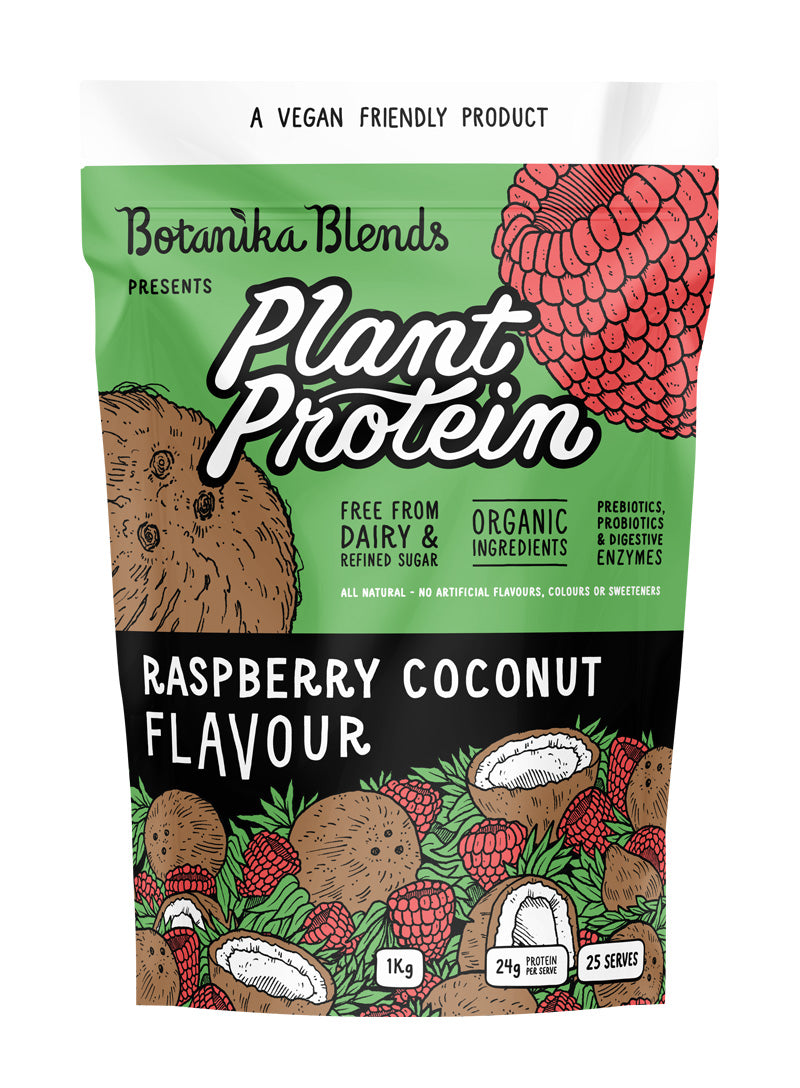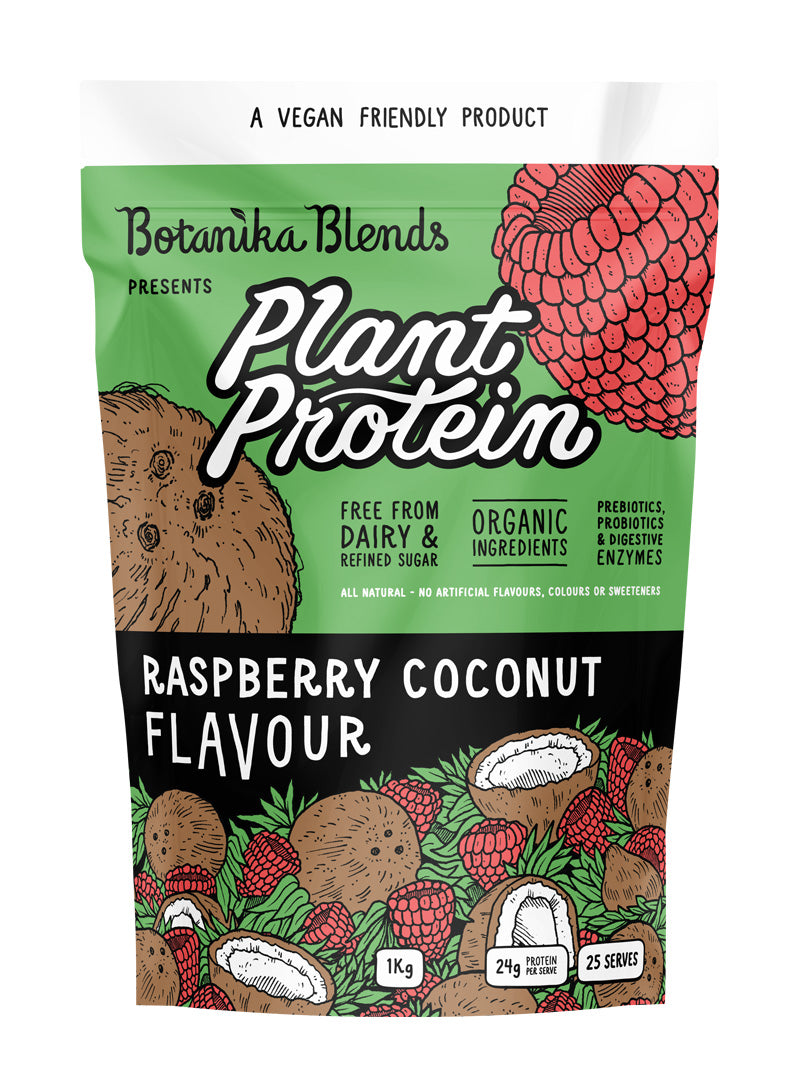Botanika Blends
Plant Protein Raspberry Coconut
Plant Protein Raspberry Coconut
Couldn't load pickup availability
Elevate your offerings with our Plant-Based Raspberry & Coconut Protein (pea + rice protein), a vegan-friendly protein that tastes amazing! Made from all-natural ingredients without any nasties, this nutritious and delicious blend is crafted right here in Australia.
RRP PRICE = $49.95 (500g)
RRP PRICE = $74.95 (1kg)
__________________
Taste the Difference
Our Raspberry Coconut Plant Protein is perfect for those who love a sweet and creamy berry taste with a hint of coconut! Our Plant-Based proteins focus on natural, gut-friendly benefits, making a noticeable difference. Plant-based diets have been consistently proven to lower oxidative stress, reduce inflammation, and control blood pressure and cholesterol. Our organic protein powder aims to be the best tasting and most functional option on the market for health-conscious consumers. Crafted by nature, powered by plants.
Key Benefits:
✨ High Protein: 25g protein per serve.
🌱 All-Natural: Free from artificial additives and nasties.
❤️ Health Benefits: Supports reduced oxidative stress and inflammation.
Additional Highlights:
✔️ Australian-made, supporting local industries
✔️ Gluten-free, dairy-free, peanut & tree nut-free, egg-free, cane sugar-free
✔️ Vegan-friendly and gut-friendly
Why Choose Raspberry & Coconut Plant Protein for Your Customers?
Offering our Raspberry & Coconut Plant Protein in your wholesale portfolio ensures a product that meets the high standards of health-conscious consumers. Its unique and delicious flavor combined with significant health benefits guarantees customer satisfaction and repeat business. This premium plant-based protein is the perfect addition to any retail lineup, providing a natural, effective solution for protein supplementation.
Ingredients:
Organic Pea Protein Concentrate, Coconut Milk Powder (8%), Organic Brown Rice Protein Isolate, Natural Flavours, Inulin, Acacia Fibre, Raspberry Powder (1.1%), Natural Marine Minerals (Calcium, Magnesium), L-Glutamine, BCAA (Leucine, Isoleucine, Valine), Beetroot Powder, Vegetable Gum (412), Raspberry Ketone, Natural Sweetener (Stevia), Probiotic (Bacillus Coagulans), Digestive Enzymes (protease, amylase, lipase, cellulase, lactase)
NUTRITIONAL INFORMATION
Serving Size: 40G
|
|
Avg Qty Per 40g Serve |
Avg Qty Per 100g |
|
Energy
|
600 kJ 143 cal |
1501 kJ 358 cal |
|
Protein (as is) |
24.9 g |
62.3 g |
|
Fat, total - saturated |
3.8 g 2.1 g |
9.6 g 5.3 g |
|
Carbohydrates |
3.4 g |
8.6 g |
|
Sugars |
2.7g |
6.8g |
|
Lactose |
0g |
0g |
|
Galactose |
0g |
0g |
|
Dietary Fibre |
2.1 g |
5.3 g |
|
Sodium |
313 mg |
784 mg |
|
Calcium |
70 mg |
176 mg |
|
Magnesium |
4 mg |
10 mg |
|
Raspberry Ketone |
120 mg |
300 mg |
|
L-Glutamine |
320 mg |
800 mg |
|
L-Leucine |
120 mg |
300 mg |
|
Isoleucine |
60 mg |
150 mg |
|
Valine |
60 mg |
150 mg |
|
Probiotics |
15 Million CFU |
37 Million CFU |
AMINO ACID PROFILE
|
ESSENTIAL AMINO ACIDS |
Avg Qty Per 40g Serve |
Avg Qty Per 100g |
|
Lysine |
2156 mg |
5390 mg |
|
Methionine |
346 mg |
866 mg |
|
Phenylalanine |
1566 mg |
3915 mg |
|
Threonine |
1107 mg |
2768 mg |
|
Tryptophan |
277 mg |
693 mg |
|
Isoleucine |
1430 mg |
3576 mg |
|
Leucine |
2454 mg |
6135 mg |
|
Valine |
1598 mg |
3996 mg |
|
Histidine |
724 mg |
1812 mg |
|
NON-ESSENTIAL AMINO ACIDS |
||
|
Alanine |
1247 mg |
3119 mg |
|
Arginine |
2491 mg |
6228 mg |
|
Aspartic Acid |
3303 mg |
8259 mg |
|
Cysteine |
238 mg |
597 mg |
|
Glycine |
1185 mg |
2963mg |
|
Glutamic Acid* |
4970 mg |
12427 mg |
|
Proline |
1298 mg |
3246 mg |
|
Serine |
1522 mg |
3805 mg |
|
Tyrosine |
1039 mg |
2599 mg |
* Glutamine
Made In Australia From Less Than 10% Australian Ingredients
Close package immediately after use. Store in a cool, dry place, away from direct sunlight
This product is not a sole source of nutrition and should be consumed in conjunction with a healthy nutritious diet and appropriate physical training or exercise program
Not suitable for children under the age of 15 years or pregnant women: should only be used under medical or dietetic supervision

FAQ About Plant Protein
Blend Rice & Pea Protein
What is plant protein?
Plant protein is derived from various plant sources, such as peas, rice, hemp, soy, and quinoa. It is an alternative to animal-based proteins, commonly used by those following vegetarian, vegan, or plant-based diets. Plant proteins offer essential amino acids that support muscle growth, recovery, and overall health.
How is plant protein different from animal protein?
Plant protein is sourced exclusively from plants and is typically lower in fat and calories than animal protein. It is free from cholesterol and contains no lactose, making it suitable for those with lactose intolerance or dairy allergies. While animal proteins often contain all essential amino acids in one source, plant proteins may require combining different sources to achieve a complete amino acid profile.
What are the common sources of plant protein?
Common sources of plant protein include:
- Pea Protein: High in branched-chain amino acids (BCAAs), particularly beneficial for muscle recovery.
- Brown Rice Protein: Easily digestible and hypoallergenic, making it suitable for those with dietary restrictions.
- Hemp Protein: Rich in omega-3 and omega-6 fatty acids, supporting heart health.
- Soy Protein: One of the few complete plant proteins, offering all essential amino acids.
- Chia Seeds: Packed with fiber and omega-3 fatty acids, supporting overall health.
- Quinoa: Another complete protein, quinoa is also rich in fiber, vitamins, and minerals.
What is a complete protein, and can plant proteins be complete?
A complete protein contains all nine essential amino acids in adequate amounts. While some plant proteins, like soy and quinoa, are naturally complete, others may need to be combined to create a complete amino acid profile. For example, combining rice and pea protein can provide all the essential amino acids your body needs.
What are the benefits of taking plant protein?
lant protein offers numerous health benefits, including:
- Muscle Growth and Recovery: Provides the necessary amino acids for muscle repair and growth.
- Heart Health: Typically lower in saturated fat and cholesterol, and often rich in heart-healthy nutrients like fiber and antioxidants.
- Digestive Health: Many plant proteins are high in fiber, supporting better digestion.
- Weight Management: Plant proteins can promote satiety, helping to control hunger and reduce overall calorie intake.
How does plant protein support muscle growth?
Plant proteins provide essential amino acids required for muscle protein synthesis. While plant proteins may digest more slowly than animal proteins like whey, they can still effectively support muscle recovery and growth when consumed in sufficient quantities. Combining different plant protein sources can also ensure a balanced intake of all essential amino acids necessary for muscle development.
Can plant protein help with weight loss?
Yes, plant protein can be a valuable tool for weight loss. It helps promote satiety, making you feel full longer and reducing the likelihood of overeating. Additionally, plant proteins often contain fewer calories and fats compared to animal proteins, making them a leaner option for those looking to manage their weight.
When is the best time to take plant protein?
Plant protein can be taken at various times throughout the day, depending on your goals:
- Post-Workout: Consuming plant protein after exercise aids in muscle recovery.
- Between Meals: Taking plant protein between meals can help curb hunger and maintain energy levels.
- Meal Replacement: When combined with other nutrient-dense foods, plant protein can serve as a meal replacement for those seeking weight management or convenience.
How much plant protein should I take daily?
The recommended dosage of plant protein varies based on individual needs. Generally, 20-30 grams per serving is typical, but your exact requirements will depend on factors such as age, weight, activity level, and specific fitness goals. It's important to ensure you're getting enough protein throughout the day to support your overall health and fitness objectives.
Is plant protein safe for everyone?
Plant protein is generally safe for most individuals, including those with lactose intolerance, dairy allergies, or those following a vegan diet. However, it's essential to check the ingredient list, especially if you have allergies to specific plants like soy or nuts. Additionally, individuals with certain medical conditions should consult with a healthcare professional before incorporating any new supplements into their diet.
How does plant protein compare to whey protein?
Plant protein is an excellent alternative to whey protein, particularly for those avoiding dairy products. While whey protein is known for its rapid digestion and effectiveness in muscle recovery, plant protein offers a slower release of amino acids, which can be beneficial for sustained muscle repair. Plant proteins are also more environmentally sustainable and can be easier on the digestive system for some individuals.
Is plant protein better than animal protein for health?
Plant protein has certain health advantages over animal protein, including being lower in fat and calories, free from cholesterol, and often rich in fiber, antioxidants, and other nutrients that support heart and digestive health. However, both plant and animal proteins can be part of a balanced diet. The choice often depends on individual dietary preferences, ethical considerations, and specific health goals.
Is plant protein suitable for vegetarians and vegans?
Yes, plant protein is a perfect choice for vegetarians and vegans as it is entirely plant-based. It provides a valuable source of protein for those who do not consume animal products, helping to meet daily protein needs and support overall health.
Can people with gluten intolerance take plant protein?
Many plant proteins are naturally gluten-free, making them suitable for individuals with gluten intolerance or celiac disease. However, it's crucial to check the label for any potential cross-contamination or gluten-containing ingredients, especially if you are highly sensitive to gluten.
What should I look for when choosing a plant protein supplement?
When selecting a plant protein supplement, consider the following factors:
- Quality of Ingredients: Look for non-GMO, organic, and clean-label products.
- Amino Acid Profile: Ensure the supplement contains a complete amino acid profile or a blend of different plant proteins to achieve it.
- Additives: Choose a product with minimal additives, artificial flavors, and sweeteners.
- Digestibility: Opt for proteins that are easy to digest, such as pea or brown rice protein, especially if you have a sensitive stomach.
Can I mix plant protein with other supplements or foods?
Yes, plant protein is highly versatile and can be mixed with water, milk alternatives, or incorporated into smoothies. It's also a great addition to recipes like pancakes, muffins, or energy bars. Combining plant protein with other nutrient-dense foods, such as fruits and vegetables, can enhance the nutritional value of your meals and snacks.
Can plant protein replace meals?
Plant protein can serve as a meal replacement when combined with other nutrient-rich foods. For a balanced meal, consider adding healthy fats (e.g., nuts, seeds), complex carbohydrates (e.g., oats, sweet potatoes), and fiber-rich vegetables to your plant protein shake or smoothie. This will ensure you're getting a full spectrum of nutrients needed for sustained energy and overall well-being.

